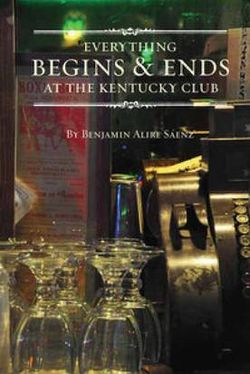The characters in Benjamin Alire
Sáenz's masterful collection are all travelers between borders. Most obviously,
they cross between El Paso and Ciudad Juarez, where each of them at some point
finds himself in the bar of the book's title. But these seven stories are
really concerned with more difficult boundaries—of class, language,
sexuality—that both set these men apart and divide them from
themselves.
 Juarez is famous from American
Juarez is famous from American
headlines as one of the most violent cities in the world. Sáenz, who teaches at
the University of Texas at El Paso, doesn't look away from its troubles, and
his characters live with the knowledge that “all the laughter in the world could
be swept away by a capricious wind at any moment.” But their lives aren't
reducible to headlines, and what remains of these stories isn't the shock of
tragedy and crime, but the human response to it.
Tragedy
and crime are at the heart of the book's first story, “He Has Gone to Be with
the Women.” Two men—one a well-known Mexican-American writer, the other a
Mexican visiting to care for a dying relative—speak after months of silent
glances in an El Paso café. As they begin to know each other, tentatively and
uncertainly, each explores the grief the other carries—two brothers lost to a
car accident, a mother to the plague of violence against women in Juarez—and
grief becomes an occasion for love. “His tears were soaking my shirt,” the
writer says. “I wanted to taste them, bathe in them, drown in them.” “I wasn't
the falling-in-love kind of man,” he says later. “But watching Javier at that
moment, I wanted to need him. I wanted him to be the air I breathed.” When
Javier disappears, gone to “all the nameless women who have been buried in the
desert,” the narrator doesn't know what to do with the feeling that has been awakened:
“I was angry at my own heart that refused to give up hope despite the fact that
I begged it to give up.”
Earlier this month, Sáenz was awarded
the PEN/Faulkner Award for fiction—he is the first Latino writer to receive the
prize—and the book is a finalist for a Lambda Literary Award. It has been met
with a great deal of praise, but some critics have raised concerns about the
emotionality of these stories, hinting at something excessive or
melodramatic about them—as though one final border they cross is that of
propriety, the closely policed lines of what we sometimes call “good taste,”
lines seldom free from often unstated assumptions about race, class, gender,
and sexuality.
 It may be true that the emotion in
It may be true that the emotion in
these stories strikes a higher pitch than most current American literary
fiction. When passion breaks out in these pages, often after being long repressed,
it can take on operatic force: “I wasn't just sobbing, I was howling,” says the
narrator of one story before making a confession of love. “I kept hitting my
own chest as if I was trying to tell my heart not to do what it was doing, to
stop hurting me, my heart, and I found myself kneeling on the floor and howling
and I didn't even know why.”
But such notes are in the heart's
range, and as I read I found Sáenz's willingness to sound them brave and
bracing. One of the glories of this collection—one of the best new books I've
read in years—is its full-throatedness, its unapologetic willingness to give
voice to extremes of experience, even when those extremes challenge the tidy
canons of propriety. Good art, especially good queer art, has always posed such
challenges. Love, grief, hopelessness and rage wear their brightest clothes in
Sáenz's work, sharing the page with a clear-eyed acknowledgment that the world
is seldom accommodating of individual desires. Love may not often win in these gorgeous stories, but it is always fierce.
Previous reviews…
David McConnell's 'American Honor Killings: Desire and Rage Among Men': Book Review
Garth Greenwell is the
author of Mitko, which won the 2010 Miami University Press Novella Prize and
was a finalist for the Edmund White Debut Fiction Award and a Lambda Award.
Beginning this fall, he will be an Arts Fellow at the University of Iowa
Writers' Workshop.



